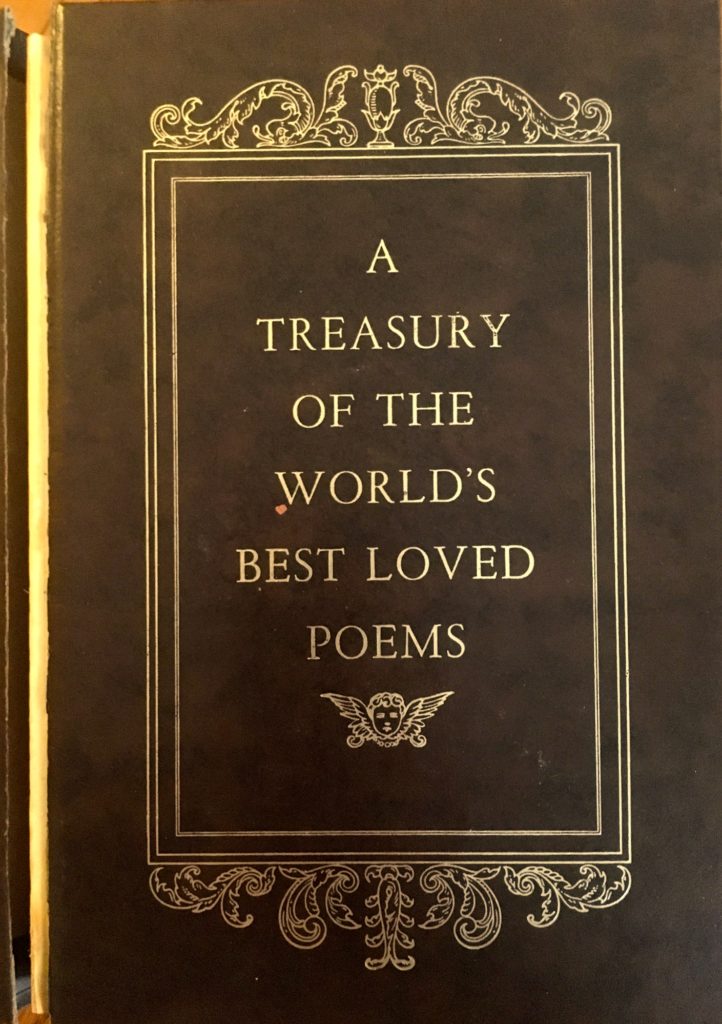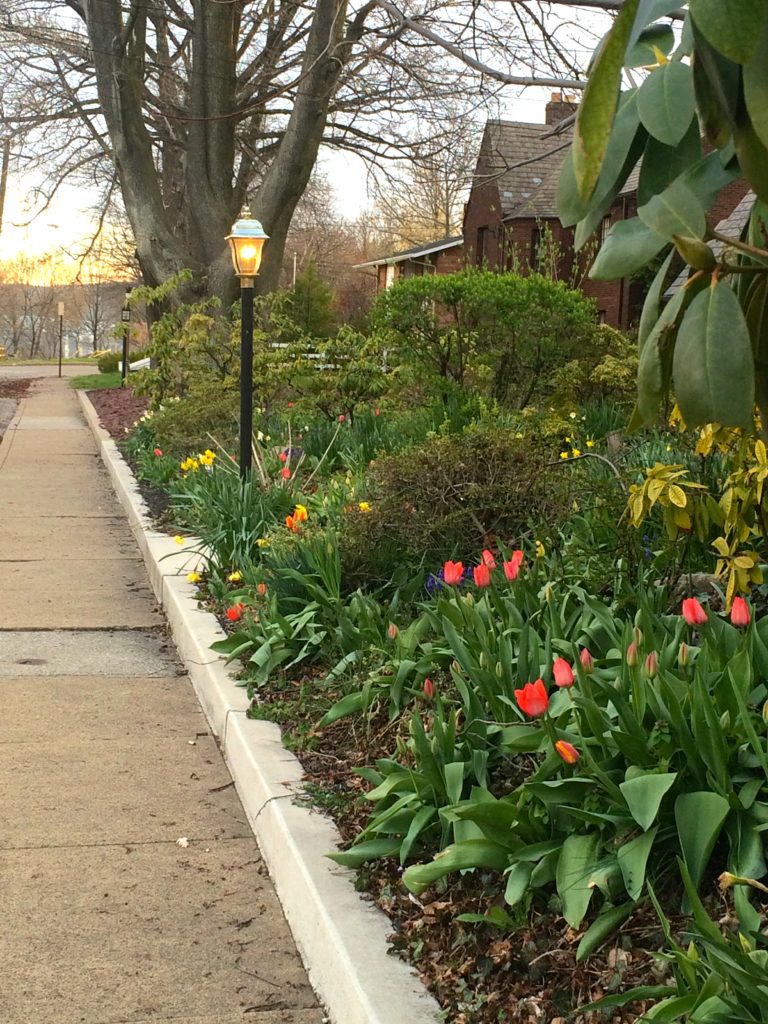 In the introduction to a treasured book of the past, A Treasury of the World’s Best Loved Poems (1961), readers are asked to ponder the question: “What is poetry?”
In the introduction to a treasured book of the past, A Treasury of the World’s Best Loved Poems (1961), readers are asked to ponder the question: “What is poetry?”
The introduction’s writer recalls the many and varied attempts at definition throughout the ages, citing poetry as:
- “the music of the soul” (Voltaire)
- “the art of uniting pleasure with truth” (Samuel Johnson)
- “the universal language which the heart holds with nature and itself” (William Hazlitt)
- that which “makes me feel as if the top of my head were taken off” (Emily Dickinson)
- “not the assertion of truth, but the making of that truth more fully real to us” (T.S. Eliot)
- Or as Albert Einstein said of truth, perhaps great poetry is “that which stands the test of experience.”
And the poet? The poet:
- is “the rock of defense for human nature” (William Wordsworth)
- “brings the whole soul of man into activity” (Coleridge)
- “has a fixed focus which all the talk and all the staring of the world has been unable to fix before him” (Archibald MacLeish)
Showing the answer to be largely elusive, and often subjective, the introductory writer remarks:
“When one reads, or listens to the reading of, a poem, its meaning and value for him are conveyed by more than intellectual comprehension. He experiences it as he does music, or a sunset, or a relationship with a loved one. His estimate is not something which can be put fully into words.”
A Treasury of the World’s Best Loved Poems features a collection of 110 poems from 44 poets, chosen for having “stood the test of experience for a great many people” and which are “likely to reach the hearts of many more for the years to come.”
Below are verses from five poems from this collection to enjoy in the final week of National Poetry Month, chosen for capturing man’s moral spirit with lyrical beauty and for inviting us to contemplate man’s capacity for thoughtful, meaningful and deliberate living:
Character of the Happy Warrior
By William Wordsworth (1770-1850)
Stanzas 1 & 2:
Who is the happy Warrior? Who is he
That every man in arms should wish to be?
It is the generous Spirit, who, when brought
Among the tasks of real life, hath wrought
Upon the plan that pleased his boyish thought:
Whose high endeavours are an inward light
That makes the path before him always bright;
Who, with a natural instinct to discern
What knowledge can perform, is diligent to learn;
Abides by this resolve, and stops not there,
But makes his moral being his prime care;
Who, doomed to go in company with Pain,
And Fear, and Bloodshed, miserable train!
Turns his necessity to glorious gain;
Read the full poem here.
From an Essay on Man
By Alexander Pope (1688-1744)
Epistle II, Stanza 1:
Know then thyself, presume not God to scan;
The proper study of mankind is man.
Plac’d on this isthmus of a middle state,
A being darkly wise, and rudely great:
With too much knowledge for the sceptic side,
With too much weakness for the stoic’s pride,
He hangs between; in doubt to act, or rest;
In doubt to deem himself a god, or beast;
In doubt his mind or body to prefer;
Born but to die, and reas’ning but to err;
Alike in ignorance, his reason such,
Whether he thinks too little, or too much:
Chaos of thought and passion, all confus’d;
Still by himself abus’d, or disabus’d;
Created half to rise, and half to fall;
Great lord of all things, yet a prey to all;
Sole judge of truth, in endless error hurl’d:
The glory, jest, and riddle of the world!
Read Epistle I here and the full Epistle II here.
Invictus
By William Ernest Henley (1849-1903)
Out of the night that covers me,
Black as the Pit from pole to pole,
I thank whatever gods may be
For my unconquerable soul.
In the fell clutch of circumstance
I have not winced nor cried aloud.
Under the bludgeonings of chance
My head is bloody, but unbowed.
Beyond this place of wrath and tears
Looms but the horror of the shade,
And yet the menace of the years
Finds, and shall find me, unafraid.
It matters not hot strait the gate,
How charged with punishments the scroll,
I am the mater of my fate;
I am the captain of my soul.
The House by the Side of the Road
By Sam Walter Foss (1858-1911)
“He was a friend to man, and lived in a house by the side of the road.” –Homer
Let me live in a house by the side of the road,
Where the race of men go by—
The men who are good and the men who are bad,
As good and as bad as I.
I would not sit in the scorner’s seat,
Or hurl the cynic’s ban;—
Let me live in a house by the side of the road
And be a friend to man.
Let me live in my house by the side of the road
Where the race of men go by—
They are good, they are bad, they are weak, they are strong,
Wise, foolish—so am I.
Then why should I sit in the scorner’s seat
Or hurl the cynic’s ban?—
Let me live in my house by the side of the road
And be a friend to man.
Read the full poem here.
The Day Is Done
By Henry Wadsworth Longfellow (1807-1882)
The day is done, and the darkness
Falls from the wings of Night,
As a feather is wafted downward
From an eagle in his flight.
I see the lights of the village
Gleam through the rain and the mist,
And a feeling of sadness comes o’er me
That my soul cannot resist:
A feeling of sadness and longing,
That is not akin to pain,
And resembles sorrow only
As the mist resembles the rain.
Come, read to me some poem,
Some simple and heartfelt lay,
That shall soothe this restless feeling,
And banish the thoughts of day.
Not from the grand old masters,
Not from the bards sublime,
Whose distant footsteps echo
Through the corridors of Time.
For, like strains of martial music,
Their mighty thoughts suggest
Life’s endless toil and endeavor;
And to-night I long for rest.
Read from some humbler poet,
Whose songs gushed from his heart,
As showers from the clouds of summer,
Or tears from the eyelids start;
Who, through long days of labor,
And nights devoid of ease,
Still heard in his soul the music
Of wonderful melodies.
Such songs have power to quiet
The restless pulse of care,
And come like the benediction
That follows after prayer.
Then read from the treasured volume
The poem of thy choice,
And lend to the rhyme of the poet
The beauty of thy voice.
And the night shall be filled with music,
And the cares, that infest the day,
Shall fold their tents, like the Arabs,
And as silently steal away.
